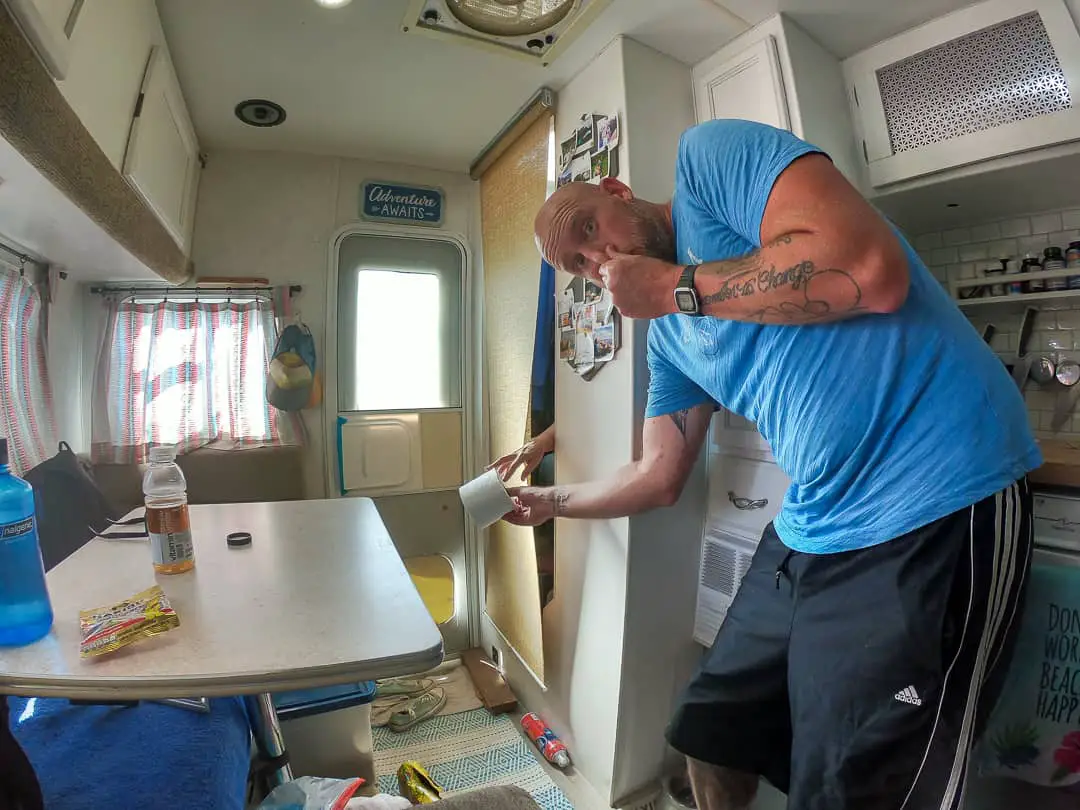Last Updated on December 9, 2021 by Chris and Lindsay
Living in an RV full time can be both glamorous and challenging. Depending on the reasons why you are RVing, your budgetary wants and needs and your family (or solo) living situation you will experience all sorts of joys… and challenges.
We left all familiarity of home behind in the spring of 2018 to live full time in our truck camper as we attempted to drive from Alaska to Argentina. For a variety of reasons, we have been unable to complete this journey.
But we have learned that we love living on the road and we have committed ourselves to do everything we can to keep living in this adventure.
If you are considering whether or not you might be able to live in an RV full time we want to cover a few key things for you to think about. We are all at different stages and backgrounds in life and for some of us, RV living is easy. For others, it is a challenge.
We hope to help you find the middle ground in your pursuit of the Abundant Life on the road by sharing some of the top challenges we face and a few tips and tricks on how we manage to overcome these challenges.
The Challenges with Full-Time RV Living
If we really wanted we could probably stretch this list out into 15 or 20 challenges! But we don’t want you to feel overwhelmed by all of the little things you will face on any given day on the road!
These are the big ones. So if you can prepare yourself for these, then we think you’ll be able to overcome the challenges of full-time RV living!
1) Living in small spaces (with a partner)
OK, this is an obvious challenge. It’s likely that your RV will be much, much smaller than your house/apartment/condo and there is no way around the fact that downsizing is difficult. When we began our life on the road we didn’t have much stuff.
We were guests in a home that did not belong to us and most of our things were already confined to a storage unit. But still, our truck camper offered a modest 75 square feet of living space and we did still need to stow away lots of things to make life on the road possible.
Where would the pots and pans go? What about the winter clothes (in summer) and the summer clothes (in winter)?
Living in small spaces is also more than just finding a place to put things. It’s also about the time it takes to do certain things that used to be so quick and easy.
Making coffee is no longer just pressing a button. It’s boiling water, seeping coffee one cup at a time in our (awesome!) Aeropress coffee maker. Washing dishes may mean a trip outside with a collapsible bin full of dishes, pots and pans. Cooking a meal – any meal – is more involved.
Regardless of how large your RV is, there are always things and processes you will have to be OK with leaving behind.
But in exchange for these things, you’ll find particular freedom that is likely the reason you are considering full-time RVing in the first place!
So you have a partner/spouse? And kids? Maybe a few dogs (yes please!)?
The challenge of living in an RV with a family becomes even more complex by factors beyond comprehension!
Finding a place and process for yourself can be challenging… now throw in a second, third, fourth person and things get interesting!
Overcoming the challenge of living in small spaces:
The best advice for overcoming the challenge of small spaces is three-fold:
a) Everything must have a place. If you can’t find a place for it, it’s likely you don’t really need it. Keep only the things you use frequently enough to warrant shelf space.
b) Give things multiple purposes (if possible). Do you need a bath towel and swimming towel? No, one will do. Can you turn a spaghetti pot into a storage container when it’s not in use? Yep.
The more purposes it serves the more valuable it is and the more it warrants the space you provide it.
c) Communicate. This is a no-brainer for anyone in any relationship. And it warrants a post in itself. But make sure to communicate with your partner and/or children is essential to surviving (and enjoying!) life on the road.
You can always buy more things to replace what you don’t have or need. But you have to spend time making sure the other people in your RV appreciate life on the road as much as you – even if they leave their clothes or toys lying around, use more water than you want them to or leave the lights on when they leave the RV!
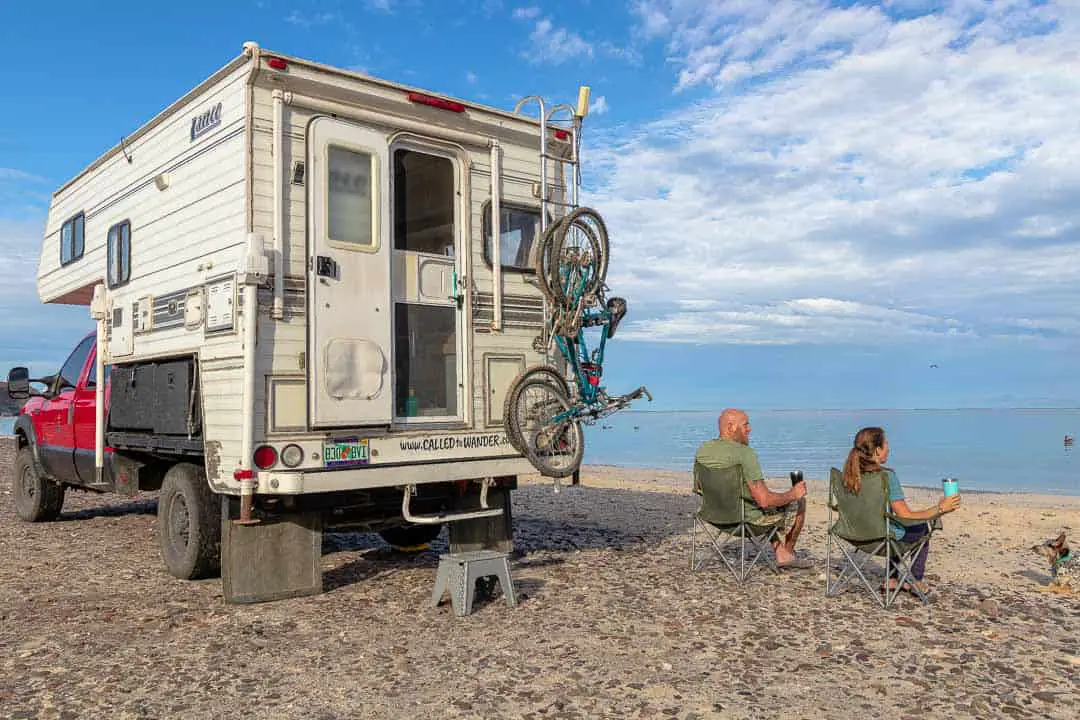
2) Breaking down/Broken things
Let’s face it, things are going to break when you live in your RV full time. The more you travel, particularly down bumpy roads, the more things shake loose and wear and tear takes hold. Let alone rust and dust and small water leaks here and there!
One of our biggest anxieties about living in our RV is dealing with a breakdown or broken things. Breakdowns are one thing, because you are sometimes left to the mercy of other travelers and/or the conditions of your RV insurance.
Broken things are another – because they can be annoying, dangerous and/or costly.
Both can weigh heavily on you, particularly if you travel on a strict budget and/or in an older RV.
Although we spent several months preparing our truck camper for the road, our refrigerator broke on Day 2 of our grand adventure. It took us nearly 4 weeks of living out of a styrofoam cooler before we were able to repair it.
A few weeks later we went to a mechanic shop to check on our rear suspension and several thousand dollars later we had a whole lot of work done that we had not anticipated.
You can’t predict when something will break. And we can’t choose where we will breakdown.
But even new RVs experience issues from the stress of the road and it is inevitable that even if you get past challenge #1 and everything has a home, this challenge will bring you frustration and angst in the moments you least expect it.
After all, we take to the road to see and do amazing things… not to sit on the side of the road, cleaning up a mess inside the camper or spending our travel budget on repairs.
OVERCOMING THE CHALLENGE OF BREAKING DOWN:
We address the challenge of dealing with the inevitability of broken things in three particular ways:
a) Be proactive with maintenance. This applies to your vehicle, but also your camper living space. Don’t miss an oil change, flush the fluids regularly and keep an eye on tire tread and condition.
But also be sure to reseal your windows and roof (as necessary), clean your solar panels and keep your living space tidy. The nice thing about taking care of things is that typically it is not THOSE things that break when you are mindful of maintaining them. It’s something else!
So start with the big things and be proactive about them as you work your way to the others.
b) Invest in the “better option” when you can. Some people can afford all of the niceties in life. We can’t.
But when it comes to picking a tire to carry out our entire life on, we only buy the best. When it comes to pasta and cereal, we’ll settle on generics. But when it comes to an oil change we’ll put in the name brand.
Sometimes the cheaper option is in fact cheap. Other times it will do fine.
Invest the time to determine the “better option” when it comes to the most essential needs on the road and know that sometimes spending a little more for something now will save you in the long run (especially with peace of mind!).
c) Carry great roadside insurance. Almost all RV insurance offers roadside insurance. But when it comes to actually towing your RV to a mechanic shop, good luck.
We had a breakdown in Utah once that required our truck camper to be towed. While our insurance was great for our truck and camper separately, it was a nightmare trying to explain the situation to the insurance agent when tow truck driver after tow truck driver turned us down due to size and weight restraints.
We now travel with 100% confidence that we will receive RV-specific roadside assistance and towing using GoodSam’s Roadside assistance. Yes, this is an affiliate link in which we will receive a small compensation if you join.
But we trust GoodSam to take care of us and know how to get our RV to the best mechanic possible in the event of a breakdown. We won’t drive a mile without it.
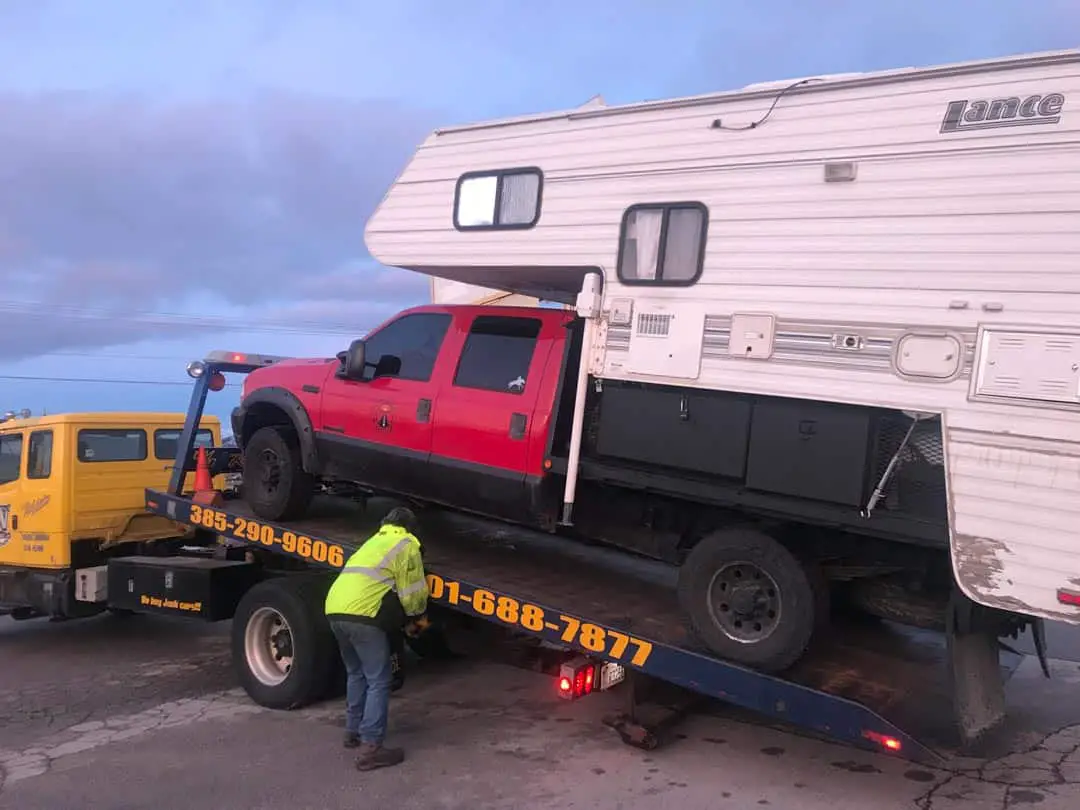
3) Travel days/logistics
Travel days can be fun, but also stressful. What do we call a travel day? This is any day when our purpose is to get from Point A to Point B.
Sometimes travel days can be exciting, such as driving through the autumn colors of upstate New York or through the desert scenery of Baja. Other times it can be boring and challenging, such as through the incredibly gusty panhandles of Texas and Oklahoma.
Although we try not to drive long distances in a day, inevitably we reach a point where we may have a 4, 5 or even 8-10 hour drive day. During these days we find ourselves stressed, bored and sometimes an ugly combination of the two.
This is even more true when we are traveling in places that are unfamiliar to us, or at night, or when we have to be at a certain place and time.
OVERCOMING THE CHALLENGE OF Travel Day Logistics
Travel days aren’t the worst challenge of full-time RVing. But they still present stress on otherwise wonderful days on the road. Here’s how we manage them:
a) Start early. When we have a travel day we may make coffee the night before and store it in our trusty Thermos. We won’t cook bacon and eggs for breakfast but will settle on a granola bar and apple on the road.
We may not be the first RV out of the parking lot/campground. But we won’t be the last. Getting an early start ensures that you get an early finish – which is important.
b) Know the route. I will often check AllStays maps and iOverlander as I fall asleep the night before a travel day just to get an idea of what kind of terrain we’re covering and what kind of amenities to expect.
If we’re traveling long distances I’ll even look for affordable fuel options along the way and plan them as stops. If we’re taking backroads, we’ll look at grades and switchbacks to see if we’re heading into parts of the road that may be challenging and/or dangerous for RV traffic.
Like most things, the more you know the better off you are. But don’t obsess over the details.
c) Finish the day before dark. This is a great rule of thumb for any day. Road signs are harder to read at night. Deer and other wildlife are more active in evening hours (and much less visible).
And finding a parking spot/setting up camp can be a challenge in the dark. In some places, such as Baja, Mexico we NEVER drove at night as cows and horses were guaranteed to be in the road.
Travel days that end in sunshine typically end better than those that end in the dark.
4) General Travel Logistics
Unless you plan to travel very, very slowly from one campground to the next you are likely to experience some stress over the general logistics involved in traveling in your RV.
From finding camping spots from one night to the next to fuel, dump stations and propane and water refills you’ll spend much more of your life on the road thinking about these things than you would in your former brick-and-mortar lifestyle.
Depending on your RV lifestyle, you’ll also want to factor in things like showers, groceries and fun activities. Of course, with each of these comes the challenge of finding out how to get there and where to find parking.
A simple trip to the neighborhood grocery store can be daunting if it has tight turns in the parking lot and small parking spaces!
OVERCOMING THE CHALLENGE OF Managing General Logistics :
Preparation again is key to overcoming this challenge. Here’s our advice:
a) Travel apps. You need to have the best apps available to help you find the places and items that you need. Read this post on our top recommended apps.
Do note that almost all mobile apps offer a free version and a premium version. We haven’t paid $1 for any apps and have managed very well with the free versions of every app we recommend.
b) Make an itinerary. We are called to “wander” not to “arrive.” So making detailed itineraries is not our thing.
But we will look a few days out and start to sketch out the kind of things we need along the way. This is particularly true as we prepare to dry camp and we want to ensure our tanks are empty and our water and pantry is full.
Knowing where you plan to go from day to day or week to week will help you when you check out your mobile apps and determine how to meet your needs along the way.
READ MORE: Check out this post on how we prepare for dry camping.
5) RV Finances
We are frugal, but not cheap. As full-time RVers building a business on the road we know that every dollar saved is a dollar earned.
So we spend a lot of our time boondocking, cooking our own meals and finding fun and FREE activities to do while we travel.
But part of the challenge of traveling full time is that there is always some new way to spend money.
Heading to Buffalo, NY to see Niagara Falls? The falls are free, but parking is not. And who can pass up Buffalo Wings in Buffalo? Bourbon in Kentucky? BBQ in Texas?
The options are endless for ways you can spend money when you full-time RV. A big, unofficial rule for travel (and life, in general) is to know yourself – know your budget, your goals and your desires in travel.
If you’re going to drive the Dalton Highway, spend the money to visit the Arctic Ocean. If you’re heading to the whale shark capital of the world, go on a snorkeling trip.
You don’t have to do EVERYTHING (unless you have the funds and desire to!) but find the balance to meet your expectations of what is possible for living full-time in your RV.
OVERCOMING THE CHALLENGE OF RV Finances:
We have a whole category of posts we’d recommend you check out if you are interested both in making and saving money while you travel. Here are a few of our top resources on the topic:
- How to make money on the road.
- How to start a travel blog.
- Travel savings tips.
6) Health and wellness
One of the most overlooked challenges with full-time RVing is maintaining your health and wellness.
Sure you may visit a lot of great places with all sorts of outdoor activities. But are you going to exercise daily while there? And every new place has healthy food options. But there are also tons of great restaurants offering local favorites that likely don’t fit into most diets.
Simple things like stretching and doing pushups and crunches can be difficult when you find yourself waking up in one Wal Mart parking lot after the next.
If you are a fitness junkie you will find ways to make the RV lifestyle work for your health and wellness goals. But the average person is going to struggle to remain in an active lifestyle on the road.
Don’t get us wrong. We’re not saying you HAVE to be physically fit. But even things like routine doctor’s appointments and preventative medicine and supplements are more difficult on the road.
Lindsay has Crohn’s Disease and we’ve always struggled to make sure she was staying healthy and fit on the road. And you may have other health issues that are more or less difficult to manage on the road.
OVERCOMING THE CHALLENGE OF Remaining Healthy and Well on the Road:
Because every person is different there are going to be different things that may or may not work for you. We are NOT health experts and certainly not doctors.
So we don’t advise you to skip taking required medicine or missing important doctor’s appointments. But in general, we have found the following practices help keep us healthier on the road:
a) Meal plan. It sounds elementary. But planning (healthy) meals keeps you from indulging in food that is not within healthy constraints. We’re not saying you have to join a strict diet regimen.
But giving yourself healthy options, especially for snacks while you are out and about, will make it easier to stay (or get) in shape. Even if it’s just planning one or two meals a day and leaving lunch or dinner open for wherever you are traveling, every little bit helps.
b) Search for activities you enjoy. We enjoy hiking and paddleboarding. So we try to travel to places where we can hike as much as we like or paddleboard as often as we please.
These activities are primarily for enjoyment and adventure. But because they require us to exert effort, they also count as great exercise. No, we don’t hike or paddle every day. But we do our best to find opportunities to do so.
c) Own a bike. Bikes are practical forms of transportation from wherever you are camping. But they also make great excuses for exercise. You don’t have to train for the Tour de France.
But instead of driving a few miles to the grocery store try hopping on your bike. Or instead of driving between trailheads give your bike a chance to warm you up before the hike.
d) Vitamins and supplements. You have to eat your vegetables. Even though you’re likely an adult without parents forcing you to eat your vegetables, you know they are good for you.
But taking vitamins and supplements are a great way to make sure you’re getting everything you need in between the tasty bites of whatever local delicacies you discover.
At the least taking a once-a-day multivitamin is an easy and affordable way to check off a bunch of health boxes.
7) Weather/Local conditions
You probably don’t think much about the weather and other local conditions where you travel. Aside from the big ones – like traveling to Alaska in Winter or across Arizona in summer, it may not seem obvious to you that weather can have a significant impact on your joy, quality of life and safety.
We found ourselves in terrible hail storms in Wyoming and Colorado, deadly winter storms in Montana, gusty winds across the Texas panhandle and fires throughout British Columbia.
From small inconveniences to expensive repairs and potential health hazards, local conditions can definitely cause unwanted stress when you’re not used to local areas.
OVERCOMING THE CHALLENGE OF Weather and other local conditions:
Clearly gaining knowledge is the best way to overcome any uncertainty and unknowns. So we recommend that you spend basic time acquainting yourself with the local trends in weather and climate.
It is as easy as downloading a mobile weather app. Or you can research the annual trends.
At the least, check national news to make sure you are not living in or headed toward a major catastrophe taking place on a national level. Part of the fun of RVing full time is ending up in situations you weren’t prepared for that turn out fine – like unexpected rain in the Mojave desert creating gorgeous desert flower blooms as you arrive in Joshua Tree National Park.
But having an idea of whether severe or unusual weather or other circumstances are taking place will make the journey safer and more enjoyable.
8) Rate/Speed of travel
We love to move. That’s the #1 joy of living in an RV full-time. If we like a place, we stay… until we don’t like it anymore, or the curiosity of the next place becomes too great.
If we don’t like a place, we just pass through.
But the rate of travel can be one of the most unthinkable challenges with full-time RVing because it is so tempting to just keep moving. Mondays don’t feel like Monday when you’re pulling up to the Grand Canyon.
And you can easily forget it is the weekend when you’re driving through the Rocky Mountains.
But if you find yourself constantly on the move then everything about RVing can become more challenging and more expensive.
Fuel is, by far, our greatest expense when we look at how much we have traveled in the past. The challenge is finding the balance between wanting to see and do more and being content wherever we end up for a little while.
OVERCOMING THE CHALLENGE OF Traveling Fast:
We can’t speak very authoritatively to this because we admit we have wanderlust very, very bad. But here are a few things we try to do to slow ourselves down”
a) Pick a place and park it. The more we travel the more we try to find places we think we would enjoy spending a few weeks exploring.
Whether it’s a state for a month or a region for a season, knowing that you are going to remain relatively stationary allows you to do more of the “living” on the road and less of the scrambling around from one cool place to the next.
b) Find work. It also helps if you have a purpose for being stationary. The longest we have stayed in places has been to work – either physical jobs to help fund our travels or virtual jobs as we drove day to day.
Growing our online business now is a priority for us so this will keep us tied down to certain places longer than we would normally stay – simply because we see it as an office with a view rather than a place to camp for the night.
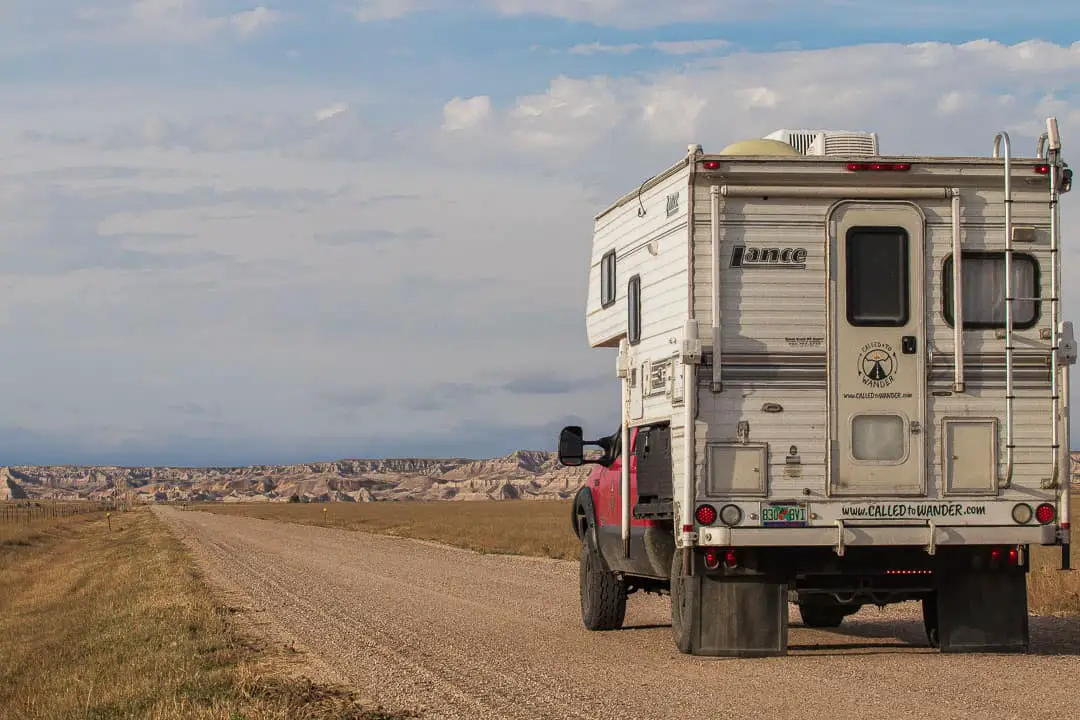
9) Dog activities (no National Parks)
If you RV with dogs you’re going to see a side of RVing that many people miss. But even though you may have your best friend traveling with you it doesn’t mean that everything is going to be fantastic.
In fact, you’re going to find many challenges with full-time RVing with dogs. From finding ways to run errands with your dogs waiting in the RV to picking dog-friendly trails to hike, there are lots of challenges when it comes to RVing with dogs.
OVERCOMING THE CHALLENGE OF RVing with Dogs
We’ve compiled a post on everything you need to know about RVing with you pup here.
In short, if your dog is part of your family you know that much of your RVing lifestyle revolves around them.
From picking places to stop during long travel days to finding dog-friendly places to camp, eat and explore – you don’t want to worry about your furry friend keeping you from pursuing the Abundant Life on the road!
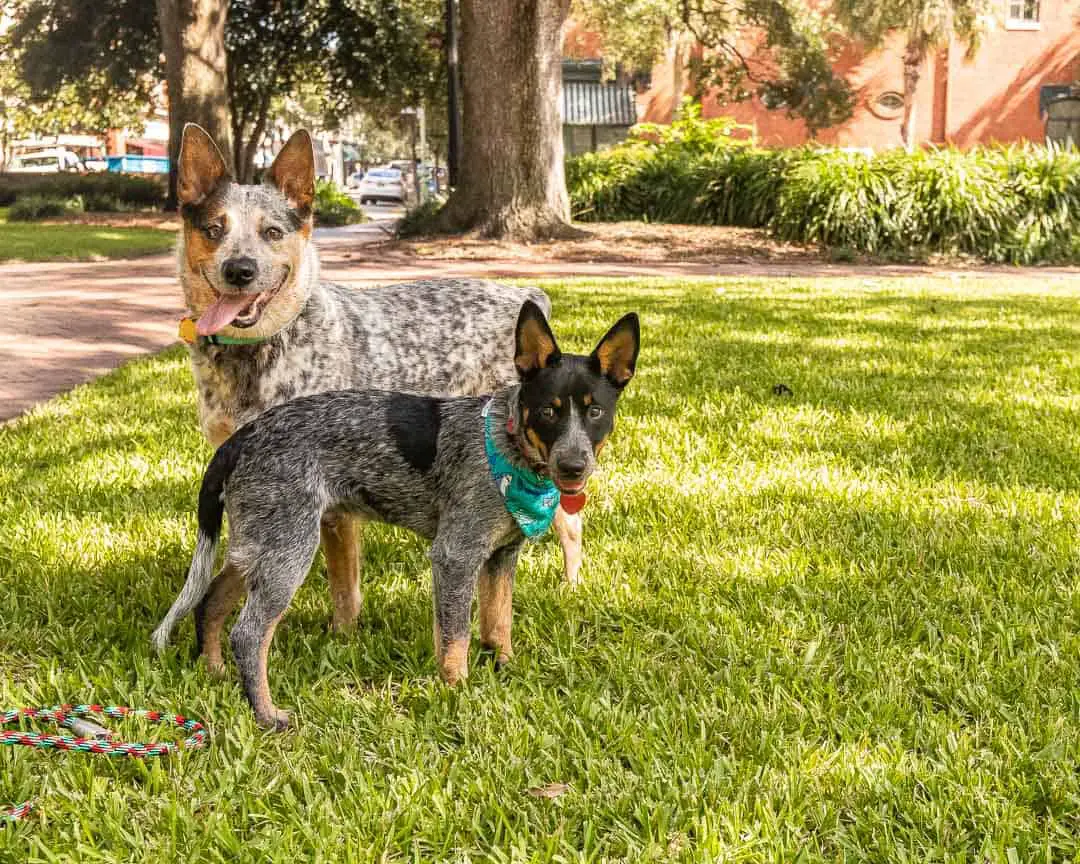
10) Bacon, Beer and BBQ.
So reading these three words probably made your mouth water. But when it comes to full-time RVing, bacon, beer and BBQ make the list of top 10 challenges of life on the road because they become precious commodities and can easily lose their value if you don’t appreciate them.
Sure, if you’re retired you can make all three a part of your daily RV lifestyle. But if you’re like the rest of us, you’ll find that bacon, beer and BBQ don’t always fit into your budget and/or travel itinerary.
We can’t tell you the number of times that we woke up at a campground to the smell of bacon on the grill. Or likewise, the number of times we heard laughter coming from the campsite next door from people sitting around a fire drinking their favorite adult beverages.
There is absolutely nothing wrong with bacon, beer and BBQ. But the point is, when you are a full-time RVer you may not necessarily have the same perspective on travel and camping as the people you run into.
Campgrounds are full of weekend warriors making the most of their short break from the daily grind. If you try and keep up with all of the bacon, beer and BBQ of your neighbors you may soon find yourself exhausted, broke and perhaps a little overweight.
OVERCOMING THE CHALLENGE OF Bacon, Beer and BBQ:
We find that a common thread for success as full-time RVers is continuing to remain true to ourselves. When you know why you are traveling and have goals for your journey then you can decide when you want to celebrate life with bacon, beer and BBQ.
But it is likely that you’ll keep them close at heart and save them for times of enjoying new friends, great views and cool nights under the stars.
We won’t ever tell you how to RV. But we will say that if we meet you on the road and share a fire and a drink together, it’s a special time… most likely followed by bacon in the morning!
